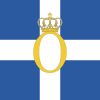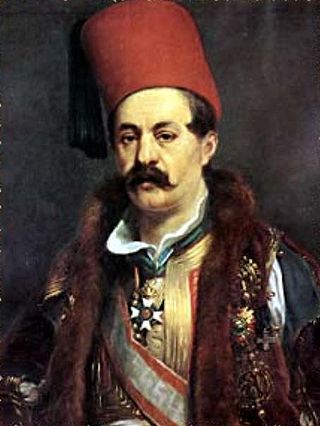
Ioannis Kolettis was a Greek politician who played a significant role in Greek affairs from the Greek War of Independence through the early years of the Greek Kingdom, including as Minister to France and serving twice as Prime Minister. Kolettis is credited with conceiving the Byzantine restorationist and irredentist Megali Idea or "Great Idea" which became the core of Greek foreign policy until the early 20th century.

Dimitrios Kallergis was a fighter of the Greek War of Independence, major general, politician and one of the most important protagonists of the 3 September 1843 Revolution.

The First National Assembly of Epidaurus was the first meeting of the Greek National Assembly, a national representative political gathering of the Greek revolutionaries.
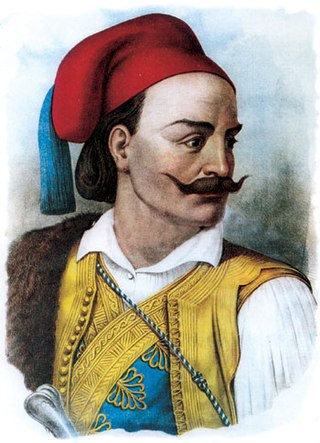
Kitsos Tzavelas was a Souliot fighter and general of the Greek rebels in the Greek War of Independence. After the establishment of the Kingdom of Greece he entered Greek politics and served as Minister of Military Affairs (1847-1848) and as Prime Minister (1847).
Early Greek parties were not features of the provisional and regional governments that were set up between 1821 and 1832. Nascent political parties were organized around a variety of interests and backgrounds, but regardless of these various factors, the political formations were named after one of the three Great Powers that established the Kingdom of Greece in 1832.

Michael Soutzos, was a member of the Soutzos family of Phanariotes, he was the grandson of Michael Drakos Soutzos; he was in turn a Prince of Moldavia, between 12 June 1819 and 29 March 1821. He was initiated into Filiki Eteria, he supported the Greek revolution in Moldavia and Wallachia and after the creation of the Greek state, he served as ambassador of the country abroad.

The London Protocol of 1830, also known as the Protocol of Independence in Greek historiography, was a treaty signed between France, Russia, and Great Britain on 3 February 1830. It was the first official international diplomatic act that recognized Greece as a fully sovereign and independent state, separate from the Ottoman Empire. The protocol afforded Greece the political, administrative, and commercial rights of an independent state, and defined the northern border of Greece from the mouth of the Achelous or Aspropotamos river to the mouth of the Spercheios river. As a result of the Greek War of Independence, which had broken out in 1821, the autonomy of Greece in one form or another had been recognized already since 1826, and a provisional Greek government under Governor Ioannis Kapodistrias existed, but the conditions of the Greek autonomy, its political status, and the borders of the new Greek state, were being debated between the Great Powers, the Greeks, and the Ottoman government.

Panoutsos Notaras was a Greek revolutionary and politician who was a leading figure of the Greek War of Independence, serving several times as president of the Greek national assemblies and legislative bodies.
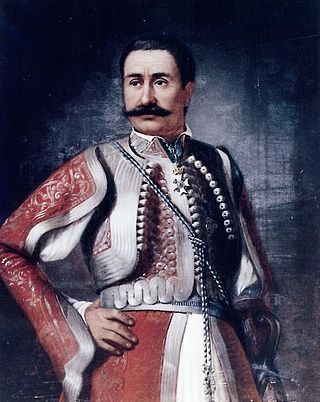
Ioannis 'Yiannakis' Stratos was an Armatolos and warrior of the Greek War of Independence. After the establishment of the Greek state, he became an officer of the Royal Phalanx.
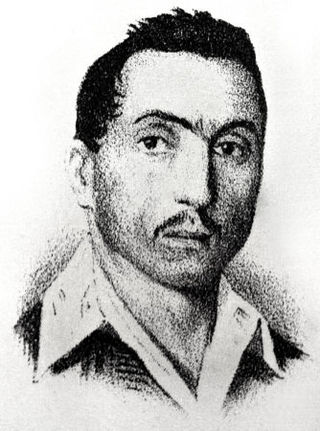
Christos Palaskas was a Greek chieftain during the Greek War of Independence. He was killed by Odysseas Androutsos’s men, during an internal conflict.

Konstantinos Metaxas was a Greek fighter of the Greek War of Independence and politician from Cephalonia.
Christoforos Zachariadis was a fighter in the Greek Revolution of 1821, and was originally from Kyparissia. He participated in military operations in Moldavia and Wallachia initially and then later in the Peloponnese. He worked with the "Committee of Zakynthos". Politically, he was considered to be a follower of the Anglophile faction.

Dimitrios Christidis was a Greek politician and economist. He served as Speaker of the Hellenic Parliament, Minister of Finance, Minister of Internal Affairs, Minister of Foreign Affairs and Minister of Justice. He was a Senator (1846–1851) and advisor to the State Council established by the Greek Constitution of 1864. He was elected several times as member of Parliament for Syros (1847–1877).
Ioannis Trikoupis was a Greek politician of the Greek War of Independence.
The Panellinion was the name given to the advisory body created on 23 April 1828 by Ioannis Kapodistrias, replacing the Legislative Body, as one of the terms he set to assume the governorship of the new country. The Panellinion was later replaced by the Senate during the Fourth National Assembly at Argos in July 1829. The body was named after the Panhellenion, a league of Greek city-states established by Emperor Hadrian.
A number of different and competing administrations used the name Administrative Committee(Greek: Διοικητική Επιτροπή) throughout 1832, each claiming responsibility for a different part of Greece, all after the dissolution of the Administrative Committee of 1831 of Augustinos Kapodistrias, Theodoros Kolokotronis, and Ioannis Kolettis and before the installation of King Otto of Greece.
Konstantinos Doumbiotis was a Greek revolutionary and military officer.
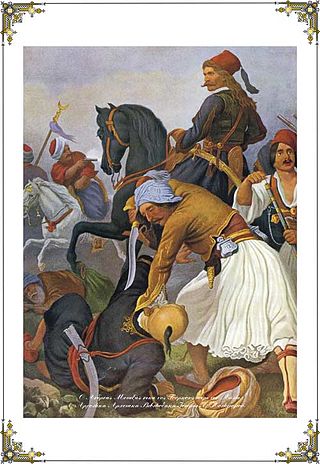
The Battle of Lalas would prove to be one of the first major skirmishes between the Greek rebels and the Ottoman forces during the Greek War of Independence. The outcome of the battle lay the foundation for the struggle against Ottoman rule in the Peloponnese.
Dimitrakis Deligiannis was a fighter of the Greek War of Independence of 1821 from Arcadia, Greece.
The Londos family was a military family from Vostitsa, which flourished during the last century of Ottoman rule in Greece, through the Greek War of Independence. They declined in prominence beginning in the 1840s.














